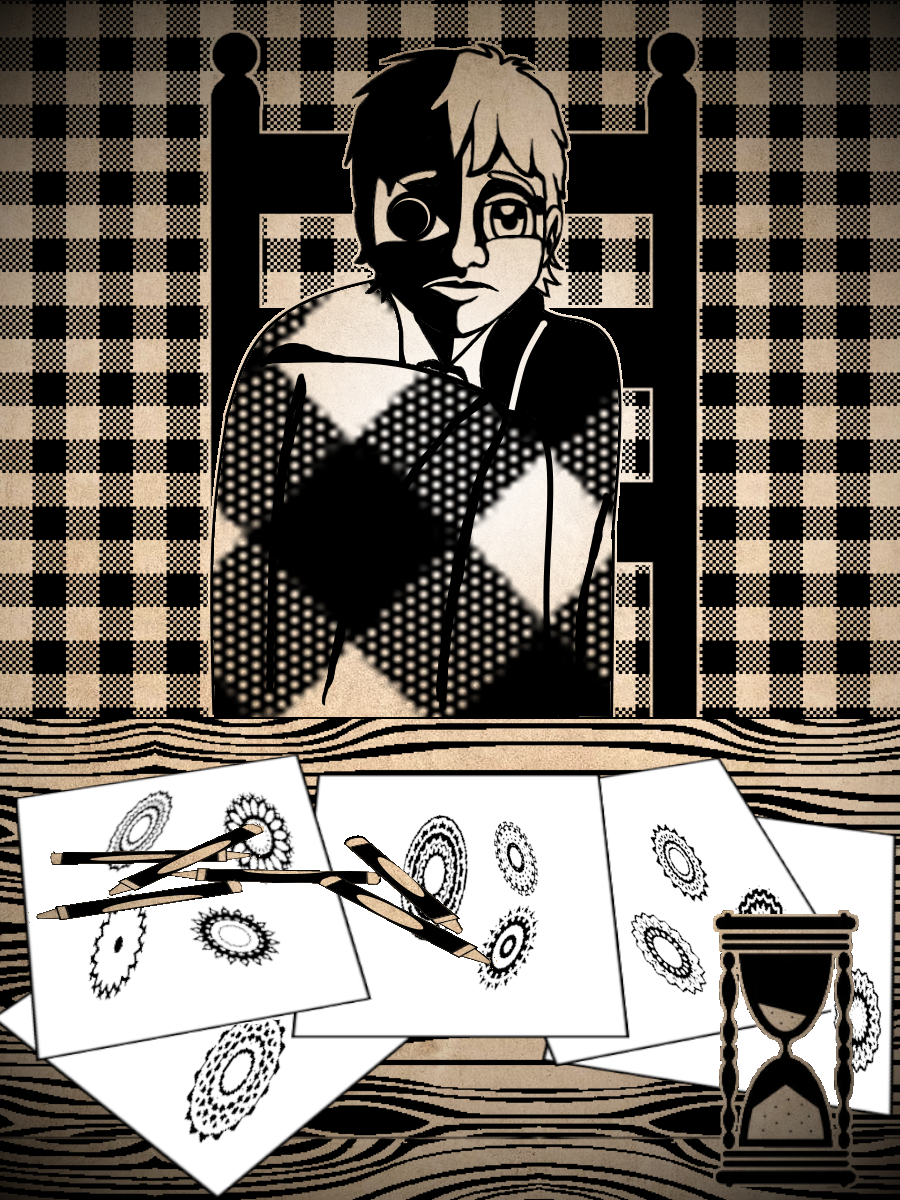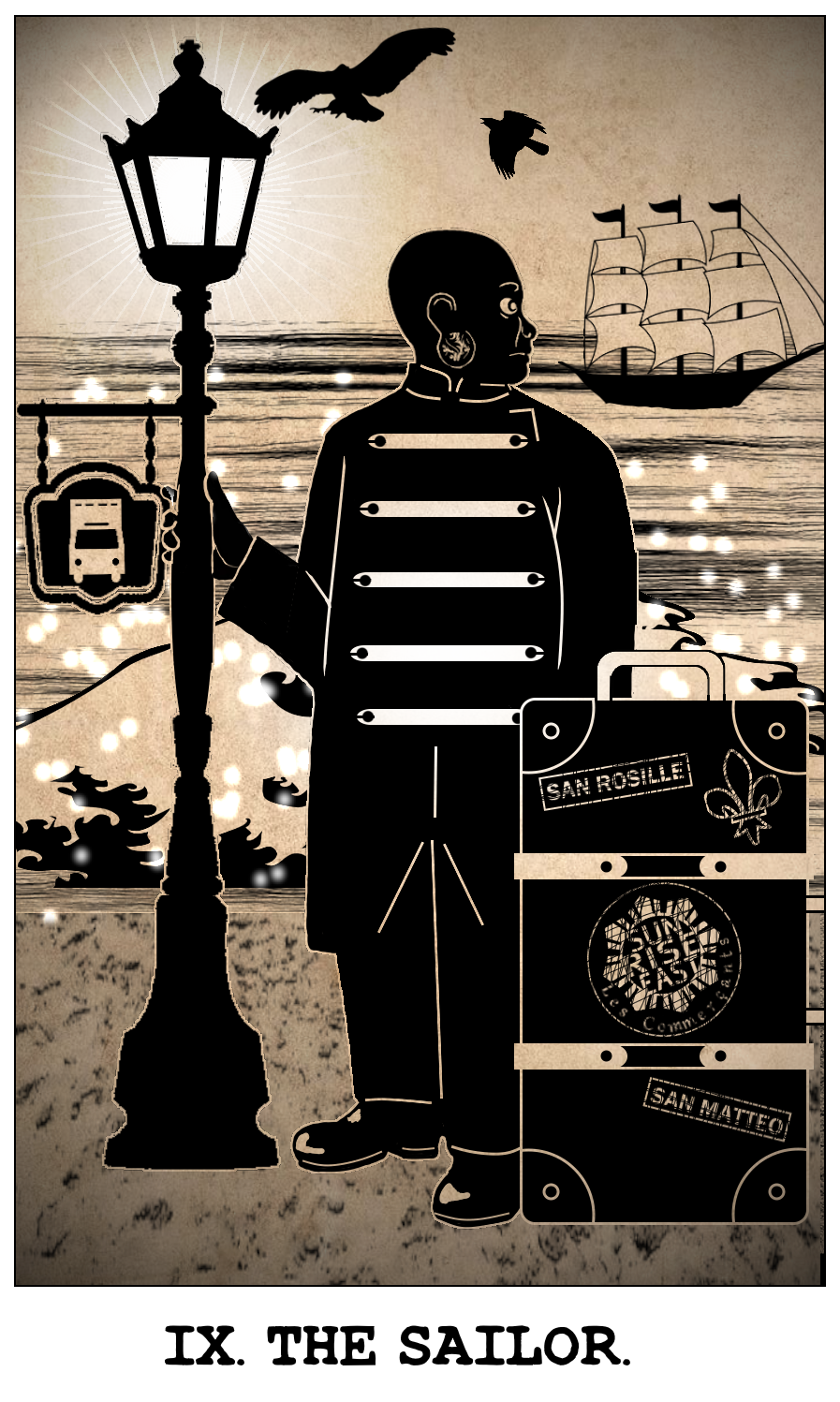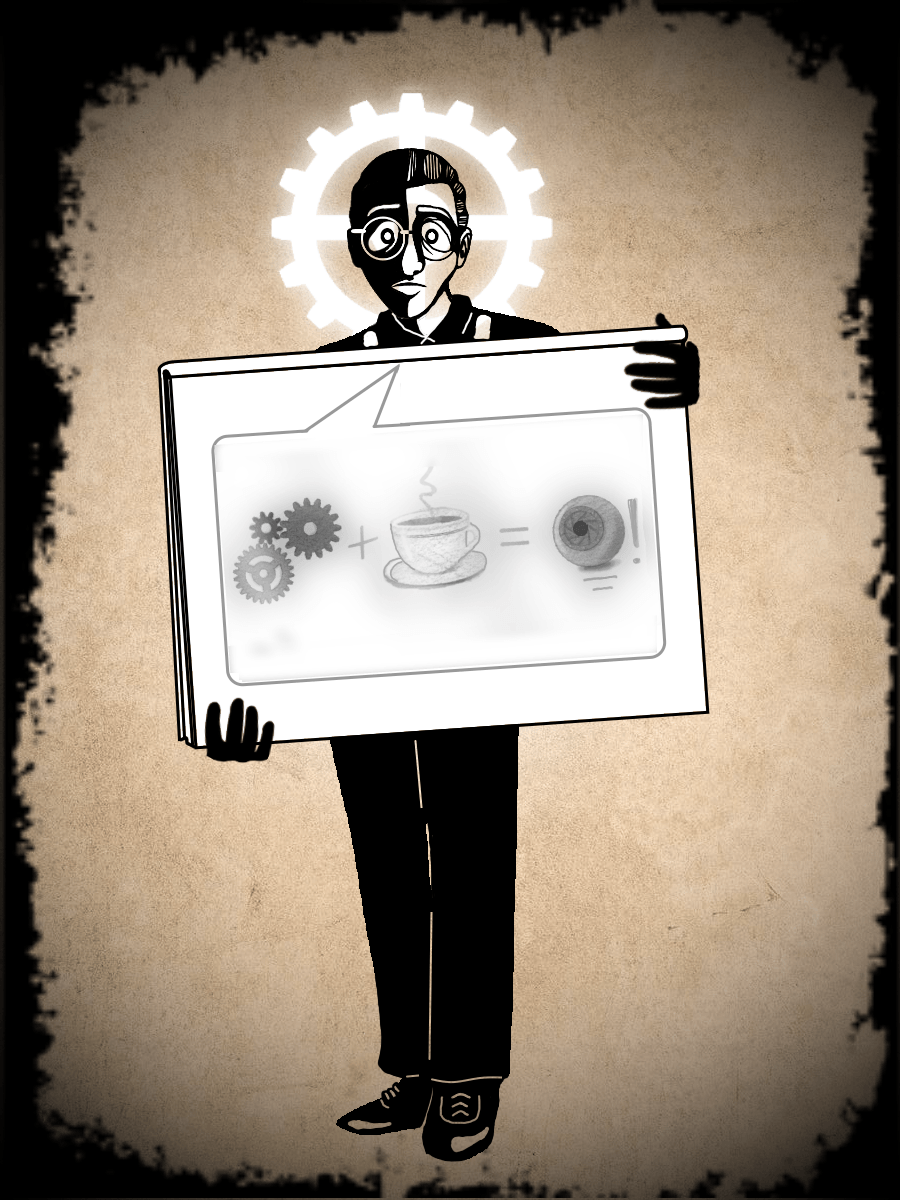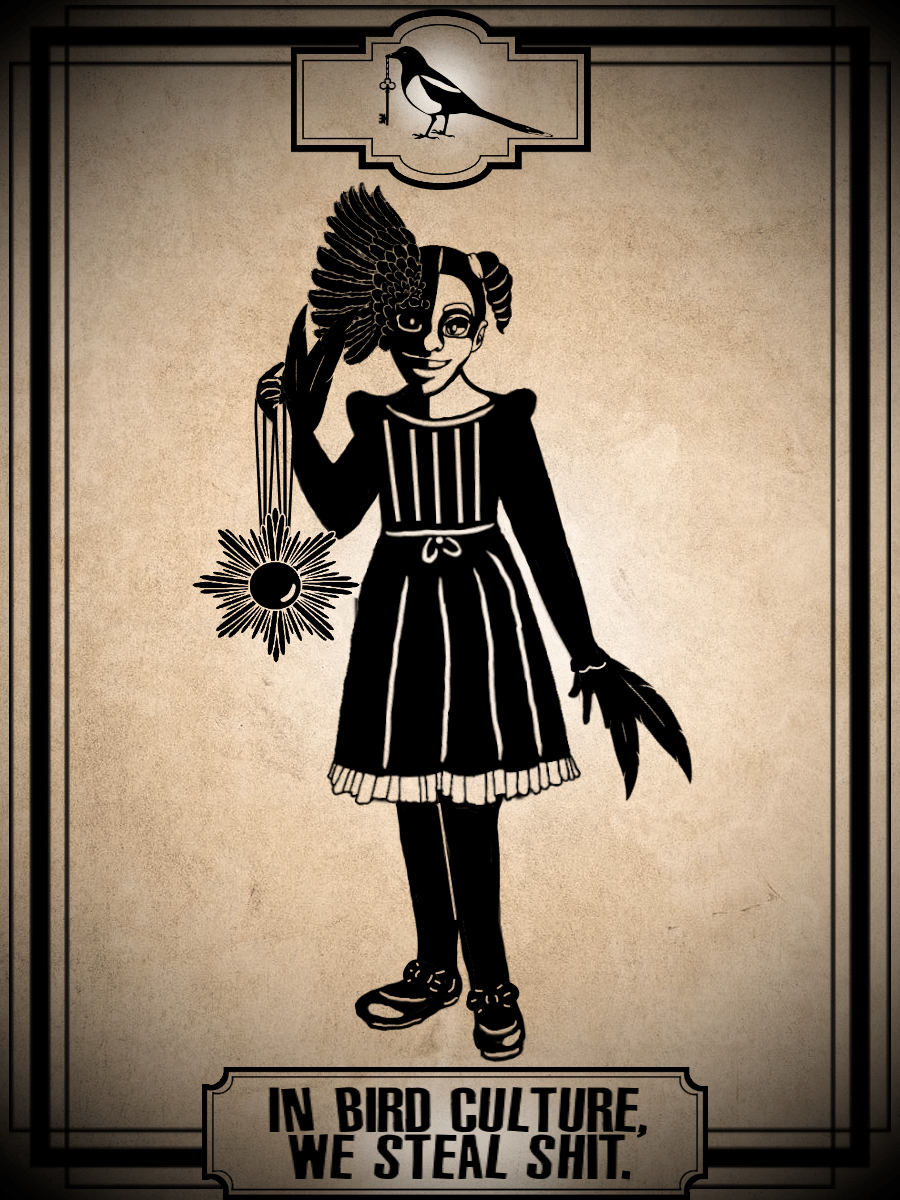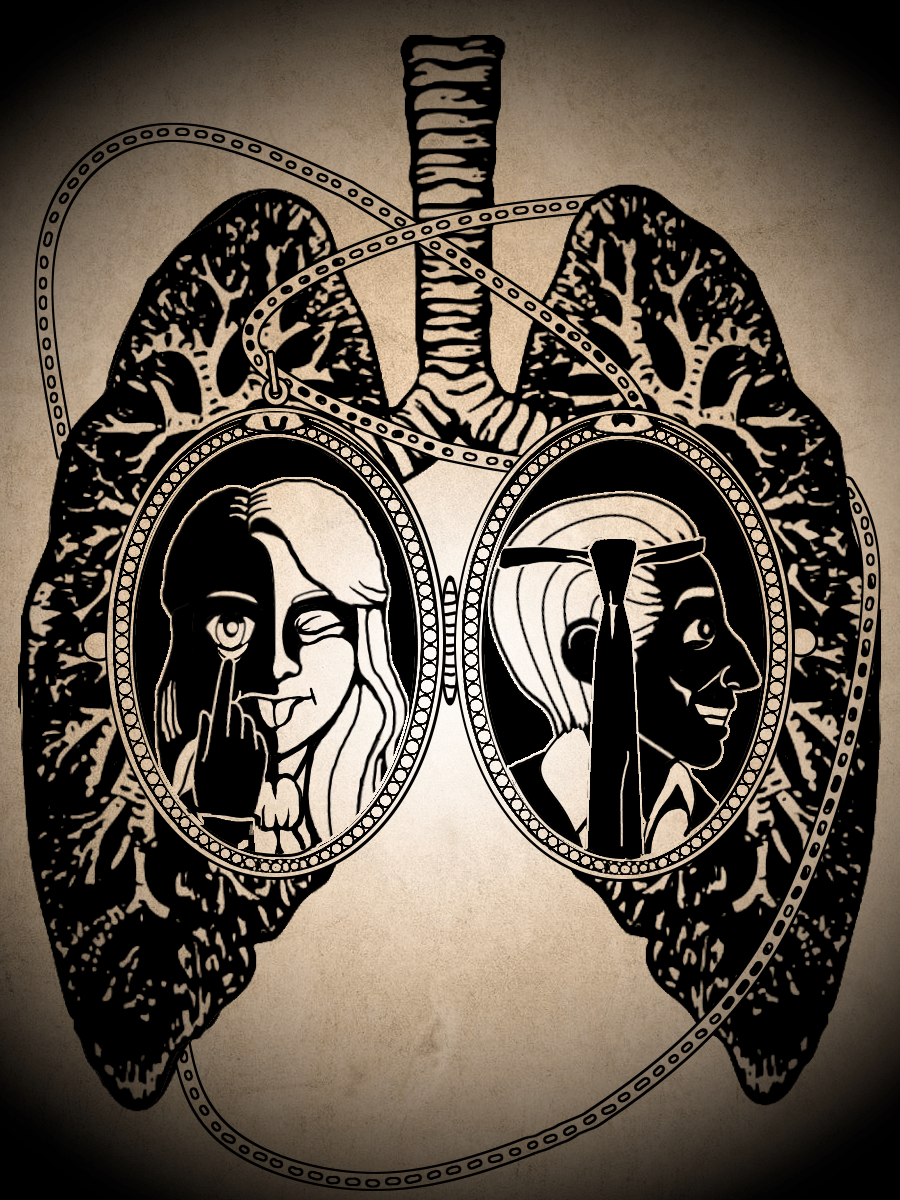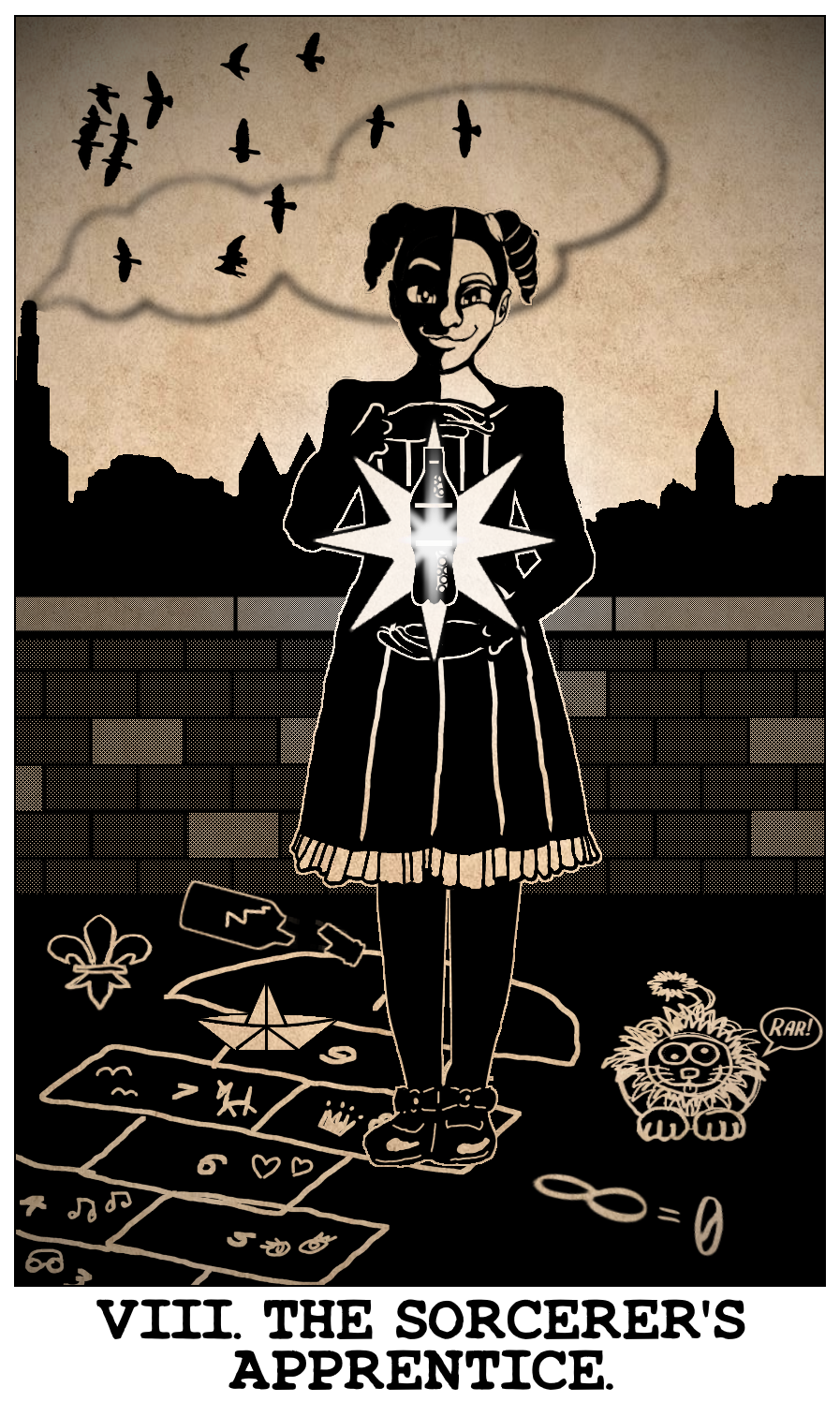Mordecai told Erik they were going to go to the drugstore and get sodas. It seemed plausible enough. Really, he had no idea what he was going to do, what he was supposed to do. He’d spent a week avoiding the subject and Erik let him because they had a fun dog to play with. But the dog was temporary and he couldn’t just keep bringing new animals into Erik’s life instead of parenting him.
Birds and lizards were super expensive, anyway. He’d checked. He didn’t trust cats. He didn’t trust hamsters either. What the hell were those? He’d never seen anything like that in the wild. It was like they designed it in a lab to be completely pointless and then croak to teach small children about death. Erik didn’t need to form an attachment to an animate cotton wad to learn about death. Erik was a lot of things, but “sheltered” was not one of them.
It was past time to devise some kind of punishment, even the kind where he shook the kid and said, “Don’t you ever do that to me again, you hear?” If he tried to fake upset like that now, Erik wouldn’t buy it. What are you trying to pull? The dog is awesome and you’re over it.
He was over the dog. He wasn’t over Erik’s inclination to start making his own decisions in dangerous situations on the fly, even when other people who knew better were standing right there and giving him direct orders about what to do.
He also knew, hellishly, that Erik was capable of weaseling his way around to avoid a voice of reason when he wanted to be making decisions for himself. The boy preferred to do it that way — path of least resistance, he didn’t like to upset anyone. Erik was out there doing worse things than feeding stray dogs, and Mordecai would only hear about it by accident, or if something went wrong.
He thought — he wanted, he hoped — Erik had at least learned to leave animals alone after the horses. Just that one very specific lesson! There could be no more wishful thinking about that now.
The problem was, Mordecai had spectacularly flunked his own lesson, one which he’d been failing to grasp for multiple decades, at the exact same time. So what was he supposed to do? Erik, you will have no dessert for a week because of this thing you can’t seem to change about yourself, and I guess I’ll join you, because I’m a piece of shit human being and I can’t change that either?
He hadn’t even tried to stop himself. Oh, after, sure. Like a split second after. Right away. But when it looked like Erik was going to do something he did not want Erik to do, he hauled out the manual and started hammering buttons with no hesitation. I know how to operate the boy! A couple light slams and he’ll feel so guilty and stupid he’ll leave that dog alone! Do a little damage to that self-confidence and he’ll be a better listener in the future too!
It didn’t even work. Erik just looked at him for an instant like he knew his uncle screwed up, and he knew his uncle knew he screwed up, and since they both knew it, nobody had to say anything about it. Situation normal, all fucked up. Now let’s see about feeding this dog. That’s way more fun.
The second time — when he invoked Erik’s dead mother, Erik’s multiple previous transgressions, and threatened to pin his own murder-by-revenant on Erik for getting himself hurt — failed to even warrant a look.
He wanted to believe it was because Erik was like Diane. Even though Erik was eight years old, with no idea how to operate his abilities, and lacking Diane’s lifetime of experience with the private thoughts of the general public for comparison. He wanted to believe Erik was somehow mature enough to be patronizing. Oh, you. I know you manipulate everyone you meet because you care. I know you’re really a good person and I’m secure. I ignored you because it just rolls off me like you’re watering a duck. It’s cute how you think you can hurt me. Really.
He couldn’t think that. It was dangerous to think that even if it might somehow be true. He had been avoiding the subject, but he couldn’t keep doing that. Nobody was going to get their dessert taken away, but they needed to communicate about this.
He thought he had hurt Erik, it was just that Erik was disciplined enough, or distractible enough, to put it on the back burner while he dealt with the dog. The dog was more fun. When the dog wasn’t around to be fun anymore, he might pick up those things his uncle had said and examine them at his leisure. He might accept them. Or, even worse, he’d already accepted that he was a brain-damaged screwup, like his uncle accepted that he was a son of a bitch. I’m not fond of this aspect of myself, nevertheless, it is part of the equation.
I can’t let him do that.
But he didn’t even know where to begin fixing it. The words “I’m sorry” curdled on his tongue, even after a week. He wasn’t sorry. I did that to stop him from being hurt! I’d do it again!
That was half true. He did it to stop Erik from hurting him, because nothing hurt him as much as Erik being hurt.
Yes, yes. So I’ll hurt him first, to stop him from being hurt. You’re not just an idiot, Morph, you are a fucking idiot.
Diane had never said anything like that to him, but it was obvious sometimes she was thinking it. In a cute way, though. In a cute way. Underneath a level of irony that softened the blow, not like when he thought these things about himself.
He couldn’t go to anyone for help with this. Hyacinth wouldn’t get it. Calliope wouldn’t get it. Ann and Milo would just be even more disappointed in him than they already were.
Seth would cuss him out in Low Southern and then punch him — not that he wouldn’t deserve it, but it wouldn’t help much.
So they were going to go get fountain sodas, in paper cups because they couldn’t stay at the counter, and he was going to wing it.
He gave Erik a couple quarters out of the glass jar and told him to pick up something fun for himself while they were out. He was not above bribery. Hey, let’s just establish I also provide you with candy and sodas before I drop this existential crisis of mine on your head. It’s not wall-to-wall awful having me as your uncle, is it?
Oh, gods, is it?
Erik wanted to know if he could buy a dog toy, so apparently Mordecai was still pretty good at tidying his surface thoughts and looking normal.
“Is a dog toy fun for you?” Mordecai asked him.
Erik made a shamefaced grin and shrugged. “Not without the dog.”
“Sam has a lot of toys. Get a you toy.” Then, if he really screwed this up, at least they’d have something to do besides sodas.
◈◈◈
There was a man in a dirty overcoat slumped and sleeping outside of the drugstore. He had a cardboard sign that said: Hungry. Need doss. Will work. Anything helps. A paper cup beside him had been labelled, Gods Bless You in the same scrawl. He had his hat pulled over his eyes and appeared to be sleeping.
Mordecai regarded him with a sigh, accompanied by thoughts about societal ills that were so well-worn they were almost subconscious. He only paused a moment on his way into the store.
Doss houses. Doss houses and workhouses. Warehouses for the poor, so we don’t have to see them like this. He’ll get his doss money, maybe enough for some liquor and a meal, and he’ll politely vanish. If he doesn’t, the workhouse will get him, or the jail. We don’t have to see them, so we don’t have to deal with them. If Hyacinth wasn’t there to catch us, Erik and I could fall that far. Or farther. Why don’t we catch people? Why don’t we all get together and catch people? We just throw them away…
While Mordecai was mulling over the societal issues, tinged with survivor’s guilt from his failed revolution, Erik detoured away from him and dropped both quarters in the cup.
“Bless you,” the man muttered.
“They have sandwiches,” Erik said. “Would you like us to bring you a sandwich in case they don’t let you in because you look like you steal stuff?”
Mordecai pulled him back. “Erik.” He shook his head. “I’m sorry, sir.”
The man grinned, showing a mouthful of bad teeth. “The kid isn’t wrong. It’s all right, kid. They’re a little better about that around here, it’s not like downtown. Don’t talk to strangers. Listen to your dad.”
“I’m very sorry,” Mordecai said. He bundled Erik into the store. “Erik, we don’t…”
Erik put up his hand for a pause, frowning. “He thinks you don’t want him to be there and you’re scared he might hurt me. And you don’t, you are. You want him to have food and a real house and a free bus pass, and… and ‘qual-i-ty-of-life’ but you’re scared of him and you don’t want to take him home with us and give him that stuff. You think it’s not fair, but you want someone else to fix it. What’s… wrong with… you?”
Mordecai stood in the drugstore, blinking, and stared at the boy. This was not the awkward conversation he wanted to be having. Where the hell did this come from? It was like being hit by a bus. “What?”
Erik glared up at him, hands fisted. He spoke through clenched teeth, “If… you… want… it… fixed… why… don’t… you… fix… it?”
“Why… Why don’t I fix systemic abuse and neglect of the marginalized?” He staggered a step backwards and laid a hand on his chest. “Why don’t I, personally, fix that? You’re asking this of a person whom you know started a revolution? You’re asking me why don’t I fix poverty?”
“Just that part right there,” Erik said. He flung a gesture out the drugstore window. The man was collecting his sign. Either he had enough money or he didn’t feel welcome there anymore. “You’re making it bigger so you don’t have to do anything.”
“Erik, you’re sounding like a conservative and it’s freaking me out a little,” Mordecai said. “Okay? I know you’re not really trying to argue me into admitting socialism is inherently hypocritical, but I need to be honest here. I did not come prepared for this. Can we get sodas and sit outside?”
Erik folded his arms and muttered towards the floor, like when he wasn’t allowed dessert until he finished his carrots, “I don’t want a stupid soda from stupid people who don’t let us use the stupid counter or the bathrooms, I want the man not to be hungry anymore.”
“Erik, not having a soda isn’t going to fix any of that stuff, it’s just going to make me incredibly nervous while I try to have a conversation about it because I don’t have anything to do with my hands.” He laughed weakly and shook his head. “I’m so sorry. It’s not funny. I just can’t cope with you having a tantrum about chronic hunger in a world of plenty.”
He kept shaking his head, and he put up his hand like Erik requesting a pause. “I don’t mean a tantrum. I mean extremely justified adult anger, except you are eight, and I’m about to get us thrown out of this drugstore by having a hysterical reaction. I have a really dark sense of humour sometimes. This is not a you-thing, it’s a me-thing. I’m going to buy us sodas. You don’t have to have one, but… Juh-Juh-Joshua X. Christopher!”
He buried his grin in his sleeve and staggered away, alternately laughing and coughing.
◈◈◈
From Eddows Lane, the closest park was Candlewood, and that was not a nice place to have a soda. They headed back up towards Violena and eventually encountered a bench. It had a metal bar across the seat to stop people from sleeping on it, which Mordecai noted with a sigh.
“This is some bullshit right here,” he told Erik. “You know that, don’t you? But I don’t design these things and we need somewhere to sit. Do you mind?”
“You mind,” Erik said.
“I do, but I can’t fix it.” He sat. Erik plunked down on the other side of the bar, frowning at it. Mordecai offered him one of the sodas, which he’d been holding. They were in paper cups with striped straws. The ice rattled softly.
Erik accepted a soda, but he didn’t drink it yet. He set it on the bench beside him, holding it upright with one hand.
“Listen, you shouldn’t say ‘bullshit’ like that around other people, okay?” Mordecai said. “That’s what it is, but I’m talking like it’s the back room of Marie Roget’s, because this is the kind of stuff we used to talk about. I said ‘Joshua Christopher’ back in the drugstore because this reminds me of something he’s supposed to have said, but you shouldn’t say that either.
“People get distracted. They’d like to scold you for how you say something so they don’t have to listen to what you’re saying. You have to play to your audience. I’m trying to remember my audience is eight years old, but stop me if I start talking over your head, yeah?”
Erik nodded warily.
“I heard a long time ago that the Man Joshua said the gods love the poor, so there will always be poor people. I remembered it because it bothers me. It’s either super shallow or the most deeply cynical thing I’ve ever heard. I can’t decide which.
“The gods probably do love poor people, because rich people can just buy what they need and they don’t have to worry. Poor people pray, sometimes that’s all they can do. But I don’t know if he meant it that way or he was just being cute. Or if he’s even a real person who existed.”
The red man shrugged. “That’s what we’re up against, Erik. It took me a long time to sort this out, and I helped start a revolution in the meantime. I’m older now, and you’re not, and you may think I’m wrong, you may think I’m full of crap, but I do think there will always be poor people. There have always been poor people, and there are just too many things that can happen to a person to knock them off the ladder. I don’t think we can end poverty, so we need to focus on making it hurt as little as we possibly can. What do you think?”
“I think you’re making it bigger again,” Erik said. “Why can’t we just help that guy?”
“You did help,” Mordecai said. “I want to talk to you about that, too, but that man can get something to eat and sleep in a bed tonight because of what you gave him. All that other stuff I want, though, not just a meal and a bed but regular meals and a home and a bus pass, we can’t do that for him. Not by ourselves. We…”
Erik put up his hand. “We… have… a… room!”
Mordecai shook his head. “This is extremely complicated and I’m not sure where to begin to explain. Us putting one person in one spare room just isn’t enough, but that’s making it bigger again. I don’t mean to say we can’t fix it as an excuse to do nothing. I know how it sounds…” He blinked. “Erik, do you remember Gary at all? With the goat?”
“I remember the goat a little,” Erik said. He touched his metal socket and looked away. “I’m sorry.”
“Uh-uh,” Mordecai said. He tugged Erik’s shoulder and made him turn. “This isn’t a memory test. A goat is a lot more interesting to a toddler, and you were just little. That’s fine. You wouldn’t have understood what was going on back then anyway, why the nice man with the goat had to move away. And he was really nice. He was trying. But he couldn’t do any better and we couldn’t help him.”
Erik was already wildly shaking his head. He waved both hands. “We… don’t… We… don’t…” It came all at once, “We don’t throw broken things away! Auntie… Hyacinth… says!” But he saw Auntie Hyacinth taking the man with the goat aside and doing just that. We can’t do this anymore, she said. I’m sorry. We can’t.
Erik was still shaking his head. Mordecai put hands on both shoulders and tried to make him stop. “I know. Hey. I know. I know we don’t. And Auntie Hyacinth didn’t want to. I didn’t want to.” He winced. “I made her.”
“Wh…” Erik began. He jerked suddenly and pulled back. “Oh, oh gods…”
“Dear one?”
“Bricks,” Erik said.
Mordecai shut his eyes. He nodded. “I’m sorry. It scared me like that too. The box was full of bricks and he put it up there on purpose. It almost hit me. Is that about what you saw?”
Erik nodded.
“You have to understand, he wasn’t trying to kill me. Not me or you, or any of us. He used to go through the trash and save things. I mean, we, we all do that,” he waved a hand, “but that was how he made money. He’d fix these things up and sell them, except the toys. He’d give the toys away. It was really cute. He was good at it.
“But he wasn’t good at picking which things to save, and he got worse and worse. It was too much. He couldn’t keep up with fixing everything he had, and there was spoiled food in there, and… and dead things. I know we had a bunch of stuff in Room 103 and 204 — some of that stuff was his stuff originally — and we still have the yard, and Barnaby has his papers, but it wasn’t like that. It wasn’t livable.
“We might’ve kept him anyway if it was just that. Hyacinth was good at managing him, and the stuff. But he started to think people were breaking in and taking the stuff. They probably were. It was the end of the war and it was a weird time. That’s why he did that with the box of bricks.
“All I could think was what would’ve happened if I sent you in there to tell him to come out for dinner, and I told her if she didn’t make him go, you and I would go.”
He sat back and looked away. “There are some people your Auntie Hyacinth and I can’t help. I don’t know what kind of help that man with the sign needs, I don’t know if I can give it to him, and I don’t even know if he’s basically a good person like Gary was.
“That’s why I want to help that man, but I’m afraid of him too. I want someone else to help him because there are other people who know more about that kind of thing than me. I want us all to get together as a society and employ those people who are good at that stuff because if we leave it to volunteers like me and Auntie Hyacinth, we’re going to screw it up.”
He shut his eyes. “Your Auntie Hyacinth was mad at me for a long time, for making her do that.
“We tried to give him money for a train ticket and he wouldn’t take it. Not even the money. I thought if he could just get out of this damn filthy city… But I didn’t know. We couldn’t help him and we didn’t know.
“I’m scared one of these days I’m going to see him on the street like that, and I won’t know what to say. I’d probably put my head down and just keep walking, like a coward. That’s why we treat beggars and the homeless like they’re invisible, we’re ashamed of ourselves, and we don’t want them to see.”
Erik sat quietly for a few moments. Mordecai sat with his eyes closed.
“You don’t know you couldn’t help the man with the sign,” said a small voice in the darkness, like a conscience.
He sighed and opened his eyes. “No, I don’t. But I don’t have the resources to try and find out. Inside of me. I’m not enough. If I start dragging people off the street and trying to help them, I won’t have enough left to be there for you. That’s the other thing I want to talk about.” He turned and looked at the little boy who wanted to fix poverty one person at a time, hard though it was. “Why did you give that man both quarters?”
Erik blinked at him. “He needs to eat and I don’t need a toy.”
“You’re sure about that? You weren’t trying to game the system and be extra good so I’d give you something more? I’m not judging. That’s why a lot of people do good things, they figure it’ll pay off later. Even if that just means going to heaven.”
Erik looked so sincerely disgusted by the idea that Mordecai did not wait for a verbal reply.
“Okay, okay. You’re a real altruist. I believe you.” He broke off and sipped his soda. “That’s a complicated way of saying what you just said. Altruism. Doing something good just because it’s good. Not thinking three steps ahead to how it might give you an advantage, which is a bad habit of mine I can’t seem to break.” He slumped forward. “You have no idea how altruism is way, way worse for you than that, do you?”
“I am not a pump,” Erik said gravely.
Mordecai stared at him. “Erik, seriously. I know you can’t help it, but if you don’t stop with the mind-reading we’ll be here all night. I’m pretty sure moral philosophy is above your grade level. Oh, man.” He sat back and laced both hands behind his head. “I knew all that absinthe was going to catch up with me one of these days, but I didn’t think it would be like this. Okay. Let me think.”
He sipped a little more soda. It was starting to get watered down.
“I’m not picturing you as the water pump in Strawberry Square to be insulting. The concept is called a happiness pump. A person who lives only to pump more happiness into the world and doesn’t care about making himself happy. That’s where you end up if you follow altruism and nothing else.
“It’s… Gods, I actually did explain reductio ad absurdum the other day, didn’t I? It’s that, but better than that dumb argument your Auntie Hyacinth made about the dog needing a gun to kill us.
“The happiness pump actually does prove that altruism alone isn’t good. Living that way devalues… I mean, it screws up the very idea of making other people happy. If everyone thought making other people happy would make them miserable like a happiness pump, they wouldn’t do it. Then there would be less happiness altogether, so living that way is actually bad for happiness.”
Erik was shaking his head again, but he looked uncertain.
“It’s complicated,” Mordecai said. He sighed. “Maybe it’s too complicated. Or maybe you’re going to grow up and be a dyed-in-the-wool utilitarian like Pavel, and we’ll stay up all night having arguments, too, I don’t know. I don’t think you’re ready to have an opinion of your own about this yet, so all I can do is give you mine and let you think about it for a few years.
“I think you have to find a balance.” He set down the soda and held up both hands like a scale. “Two quarters in the cup and no toy for you is totally off-kilter.” He raised one hand far above the other and leaned sideways, demonstrating. “You’re not a pump. I don’t want you to be a pump.”
“But I don’t need another toy to be happy, and two quarters is more…” The anger melted out of Erik’s expression and became confusion, and then sadness. Almost crying-sadness. “No. No it isn’t. It isn’t more help. He just put the sign away a little sooner.”
His gaze drifted to the middle distance. The bench and the sodas were just a frame around something else; he looked past them.
“He’s going to spend it all today, and tomorrow he’ll be back in the same place. Two quarters won’t fix him enough so he can find work or pay rent, and he already knows that. He’ll have a chopped steak and potatoes instead of a chicken sandwich at the pub and that’s all the difference it makes. Today I gave him enough money for food and a bed and tomorrow maybe somebody else will, or maybe they won’t, or maybe he’ll go to jail, or maybe the workhouse’ll get him, and he never knows.
“He can’t be happy like I can be happy because he’s not safe. He knows he’ll be hungry again, he knows that all the time, even when he’s drunk. It’s like he goes around a merry-go-round every day and ends up right back where he started, and there’s no way off, there’s no way off…”
His eyes refocused. The metal one gave a soft whir. He was looking at his uncle again. He had to struggle to find the words again, because he was thinking about this stuff instead of just reporting what the gods had dumped into his head, “Is… it… like… that… for… Seth?”
Mordecai was shaking his head. He closed his mouth, pained. “Erik, I… I don’t know.”
Erik put up his hand, both hands. The soda tipped over and he let it. “Seth isn’t like the crazy ones and he knows how it is all the time too! It’s worse, because he knows the kids…”
Mordecai took hold of his shoulders and crouched to his level. “Erik, we’re going to think about something else now. The dog, okay? We’re going to go home and play with that really neat dog that Auntie Hyacinth made for us by accident. That’s really amazing we have a dog. We could write that up for a paper and get published in a science magazine. I bet the General is thinking about it. She thinks that kind of thing is fun. She’s out of her mind. She thinks we might have a connection with Hyacinth’s silverware drawer, did you know that? Huh? Erik, please think about this stuff instead. Please. I didn’t mean for this to happen…”
“Soup… is… hungry… too,” Erik said softly. He sobbed and covered his mouth with a hand. “It’s not all for the dog. He eats when there’s food because sometimes there… there… isn’t.”
“Please, Erik, you have to…”
(It’s so many. It’s so many. It’s so many…)
He didn’t think Erik said it out loud. Probably he couldn’t say it out loud, he was just trying to get it out of his head the only way he could. This violation. This understanding that was too big for him, too big for anyone.
The boy was filing through all these images like a picture book from hell. Some of them were things he’d seen on the street, or in newsreels; some of them were out of his uncle’s head; and some of them were just there, distant people from distant places and distant times that he couldn’t know about unless he was told. Unless they were telling him.
These were only echoes. He didn’t feel them like Erik did. It was like he smelled smoke and he knew something was on fire somewhere close to home. Except he also knew Erik had sent him the smell of the smoke, and it was because he was trapped in the goddamn building and burning alive.
He wrapped both arms around Erik and drew him near, hiding him. Close. Tight. Tighter. Like when the shell fell in through the skylight and he didn’t want Erik to die.
Stop it, he thought. Stop it. You sons of bitches, just stop. Stop it and let me clean up what you’ve already done. You’re going to kill him!
He saw, clearly saw, a small green hand holding two quarters at the edge of a wishing well. He could feel the rounded toes of the boots digging into the stonework to boost the boy’s body up. It was a big well for big wishes. The stone was cold and smelled of damp moss, and he couldn’t even see the water inside.
The two coins went tumbling into the darkness and vanished. He waited to hear them hit the bottom, and waited and waited, but they didn’t. Because there was no bottom. And nobody got any wishes ever.
“Please, Erik, don’t,” he said softly. “I know how it feels, but don’t lose hope. Please.”
(Why?)
He wasn’t sure if that meant why things were the way they were, or why a person shouldn’t lose hope. Maybe it was both.
“Erik, look at what I’m thinking right now. Not all that other crap from the past. I have a broken brain and it’s always throwing up crap like that for me to think about. That’s just noise. What am I thinking about you right now? It’s right up top on the surface. You see it?”
The damp face nodded against his shirt. (I’m at the beach. But…) Faint irritation. (That’s stupid. I used to pretend I was gonna dig a hole to Xin, but I never tried to do that. It’s too big.)
(Erik, I’m thinking you want to empty the ocean and all you have is a bucket because that’s like how you want to help all the poor people. You could spend your whole life bailing and you’d never make a dent. You can’t empty the ocean, you can only make yourself miserable trying. But that doesn’t mean it’s hopeless. That means we do something else instead.)
He pictured that boy throwing quarters into the big well to make a big wish, saw it as clearly as he could. Then another boy came and threw some money. Then a girl. Then a family. Then a nun, who also threw a phony ten sinq note with prayers on it. Then a rich man threw a couple of gold coins and had people take pictures of him doing it.
Then a whole bunch of people came dragging a government official. He nailed a sign to the well that said “Fair Tax Rates” with a bunch of squiggly small print about how much you had to throw into the well by law.
The rich man came back and threw multiple bags of gold coins into the well, weeping. The nun added a real ten sinq note with an irritated sigh.
And more people came, and more and more people came. They made more laws and people had to throw medicine into the well, and schoolbooks, and safe places to sleep.
And at some point, nobody was quite sure when, they all started to hear these things hit the bottom and make a difference. They couldn’t let up, the well ate these things and they always needed to add more, but together they were making it better.
No wishes, just a fair amount from a lot of people, and laws to keep it fair.
Erik sniffled and sat back.
Mordecai opened his eyes and tried to smile. “I’m bad at metaphors. Pavel always said so. He’d say, ‘Hey, are we trying to solve real problems here or win prizes for terrible fiction?’”
“No, I get it,” Erik said. He sniffed again and rubbed his left eye, that was the one that could cry. Mordecai delved into his pockets and produced a crumpled tissue, which Erik used. “But we don’t do that. Not big like that, with the laws. It’s just a few people throwing in what they want, like at the beginning.”
Mordecai nodded. “It’s because we — the human race, all of us — can’t agree on how to make it better. Some people don’t even want to make it better, they want to make it worse, because they think poor people choose to be poor, or they’re being punished for their sins. That’s why we need the laws. But it’s hard to get enough of us together to make the laws. Even a revolution won’t do it. I don’t know what will.”
“It’s awful.”
“It is. But you can’t lose hope, Erik. Do you know what happens when you lose hope? I’m going to tell you in case you weren’t paying attention. You see someone with a sign asking you to help, and this black rain cloud full of bad thoughts about how no one helps forms around your head. Then you don’t see that person anymore, and you start to walk into a drugstore without doing anything to help like all the rest, even a small thing you could do, like a couple coins or a sandwich. Then your kid puts some money in his cup and you feel like an absolute asshole. Get it?”
“Do you not have any more hope, then?” Erik said, frowning.
“Sometimes I do, and sometimes I don’t. It’s that balance I was talking about.” He put up both hands again, wobbling on the bench. “I’m bad at it. I tip too far in one direction or the other and all my hope runs out.
“But I always come back to the centre and find something that fills it up again. I don’t like how they dumped all this information on you, and I don’t like how it upsets you, but being upset is the right reaction for you to have. Not like ‘oh, well’ or ‘there’s nothing I can do.’ Upset. So that makes me hopeful. Like maybe someday enough of us will feel upset at one time to start making real changes. Maybe.”
Erik put his hands up like a scale, too, trying the metaphor on for size. He pictured himself balanced on a big ball like at the circus, with a teacup on his head. Or maybe a bunch of teacups, all stacked on top of each other. One of them had just fallen off and broken and he was sad about it, but his uncle was over there in the centre ring surrounded by broken teacups and still going on with the show.
“I think knowing you’re still hopeful makes me feel hopeful,” Erik said. “Does that make any sense?”
“Sure,” said Mordecai. He smoothed back Erik’s hair and dabbed under his metal eye with the cuff of his sleeve. “The amount of respect you still have for me after all you know about me doesn’t, but I guess that’s where love comes in, and love doesn’t have to make sense.”
He breathed a weak laugh. “I brought you out here to… Gods, I don’t know. Not even apologize. Just… Just to tell you I didn’t mean to hurt you when I yelled at you about feeding the dog. I don’t really think you…”
Erik blinked at him. His metal eye whirred and adjusted. “No. You do think that and you did want to hurt me. It was like I was walking into traffic. Well, I wasn’t, but you thought I was. Like the ‘Flashback’ monster got you for a couple seconds. You couldn’t grab me for real, so you, like, threw a trash can at me. You wanted to hit me with it so I wouldn’t get hurt worse.
“And you really do think there’s something wrong with me that I don’t know how to protect myself and if I keep getting hurt my mom’s gonna come back and kill you. I know you loved my mom, but she scared the hell out of you too. I get it. What’s the problem?”
“I,” said Mordecai. “Oh, gods, you’re worse than Diane — I don’t mean that! Not how it sounds! No.” He shook his head. “You’re looking right at me and you know exactly how I mean it, and it’s like I must think you’re an idiot when I start explaining something you already know, right?”
Erik frowned. “Not an idiot. Maybe just not paying attention?”
“Okay. I should’ve realized. I’m not paying attention. Give me a couple seconds to adjust my perception of reality. I don’t want to get distracted.”
Mordecai picked up both soda cups. Erik’s had leaked out on the cobbles while they were talking. His own was mostly melted ice, but he sipped it anyway before returning to the subject at hand: “Erik, the problem is that I threw a goddamn trash can at your head and I didn’t even need to do it to keep you safe. I was more of a danger to you than the dog. Did I hit you? Did I hurt you? Please, be honest with me.”
Erik shrugged. A moment later he nodded. He spoke as if evaluating a new flavour of Pin-Min, “It hurts how I scare you all the time, and you reminded me about that. I feel like I can’t be good and I’m going to keep hurting you. But it also hurts because I know you know it’s bad when you mess people around to make them do what you want, and you can’t be good either. I get mad about you being bad and I want to throw trash cans at you, too, but that’s not modelling the behaviour I want to see.” He pronounced it quite matter-of-factly, like the title of an arthouse flick he’d heard about. It’s called Modelling the Behaviour I Want to See. By that Andalusian Dog guy.
“Oh, gods!” Mordecai dropped both sodas and clutched his head in his hands, cackling. “Oh, gods. Oh. It’s not funny. This is that dark sense of humour I warned you about. I’m so sorry. You’re parenting me very well. I appreciate that. And it’s horrifying. Oh, no. Oh. You can’t keep doing that. Oh, boy. Okay.”
Calmer now, he sniffled and wiped both eyes. “I know you’re being as good as you can be, dear one. Scaring me sometimes, hurting me sometimes, doesn’t make you a bad person. I love you and I scare easy. I’ve got to be better about how I react when I’m scared, but that’s not your fault for being a normal child… As normal a child as you can be with me taking care of you.”
“How is it when I screw up I’m a normal child but when you screw up you’re an asshole or a son of a bitch?” Erik said.
“It’s the difference between eight and fifty-eight,” Mordecai said. “And I can’t explain it. You’re going to have to grow into understanding. I’ve done enough explaining anyway. I’m sorry about the sodas. This was a terrible idea.”
“I don’t know,” Erik said. “I’m sorry about the sodas too. We didn’t need the sodas. But… I feel like how you felt after that box of bricks landed in front of you. Except I can’t make the Invisibles move away. This was a trap, and it was on purpose, and there’s probably more. I’m little and I don’t know a lot and there’s a lot more stuff they can hurt me with. This one didn’t squash me because you were here to tell me how we can fix it and not to lose hope. I’m scared of the other traps and I’m glad this one fell on me when you were here. So I don’t mind as much about the sodas.” He cleared his throat. “I kinda wish I didn’t spill mine ’cos I’m thirsty.”
“Can you make it home?” said Mordecai. “I think we’ve got the stuff to make lemonade. Then you and Soup can pick something really unhealthy for me to bake. We’ll help two people not be hungry today, and maybe have some fun.”
Erik nodded and took hold of his hand. They walked home like that.
Mordecai couldn’t help thinking, as they navigated the uneven cobbles, that it was a lot easier to stay in balance with somebody to hang onto, but he didn’t ask if Erik thought so too.

